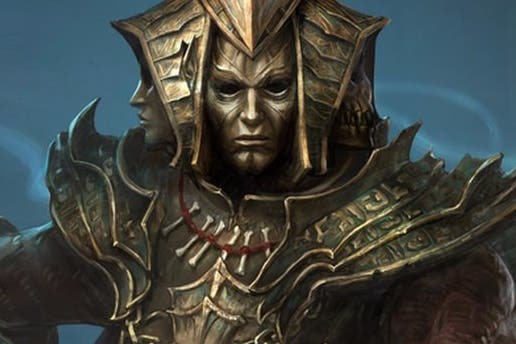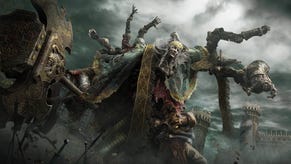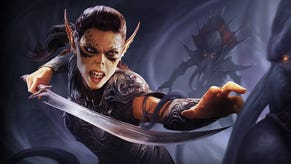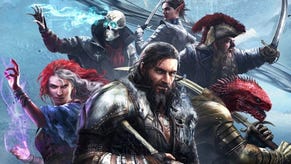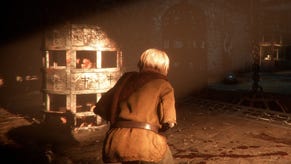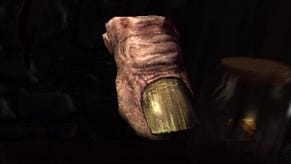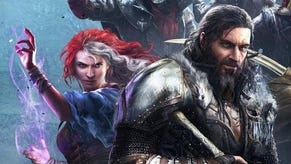Divinity: Original Sin 2 review
God killer.
About halfway through Original Sin 2's campaign, you acquire the ability to talk to ghosts. Cast "Spirit Vision" in any given area of its massive, detailed world, and any nearby souls waiting in the queue to the afterlife will be revealed to you, their transparent outline glowing with a greenish hue.
In other games, this would be a neat gimmick useful in a few specific circumstances. In Original Sin 2, it's like putting on the glasses in John Carpenter's They Live. It changes everything. Suddenly, the world becomes alive with the dead. They wander through the streets, linger amongst revelling tavern patrons, hover over battlefields staring at their own corpses.
You've been given the keys to a whole new reality, and it's going to unlock a lot of doors. Remember that murder you were investigating? Never mind finding the murder weapon or an incriminating letter, just ask the victim whodunit. Looking for a secret passage in a dungeon? Maybe there's another, less fortunate adventurer floating around you can glean some advice from.
It's a revelatory feeling, and it isn't the first or last time that Original Sin 2 evoked such a sensation within me. Indeed, it's just one example of a theme that defines Original Sin 2: nothing is as it seems, and there's always another way of thinking about a situation.

Admittedly, this was more or less the premise of the first game. In fact, at a glance you'd be hard pressed to tell the difference between the two. Original Sin 2 carries over all the best elements of its predecessor along with, annoyingly, a few of its flaws. But as you delve deeper into Original Sin 2's labyrinthine story, it becomes clear the two diverge like grape juice and wine. The former is light, fresh, unadulterated. But things have happened to the latter, and it's come out the other end darker, matured, and delectably intoxicating.
Indeed, if there's another theme that defines Original Sin 2, it's corruption. After escaping from the Sourcerer prison of Fort Joy, you and your party embark on a race for power. A malevolent force known as the Void is slowly wrapping its tendrils around the world, and to defeat it one of your party must ascend the status of Divine, a form of godhood previously attained by a Christ-like figure named Lucien.
Alongside your ragtag band are at least a half-dozen other factions scrabbling toward Divinity, from the ruthless Magister sect led by Lucien's own son, Bishop Alexander, to a Necromantic cult known as the Black Ring. Even the Seven, the pantheon of gods whom Lucien once served, have succumbed to bickering and infighting in the shadow of the Void. Their quarrel is so grievous that each god selects a different member of your party to be their "Chosen One", which has all kinds of potential ramifications for your party's own cooperative efforts.
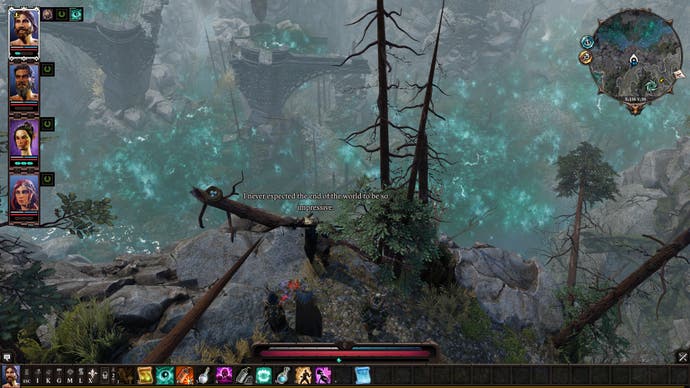
As the different sides clash and atrocities are committed, what should be a straightforward battle between good and evil turns into a grey malaise where it's hard to tell which side is the most contemptible, let alone who is right. Larian drip-feed the ensuing twists and revelations over many hours, slowly peeling back the skin of each faction and letting you prod at the flesh beneath to decide just how rotten it is.
It's a strong plot, adopting the perspective that everybody is the hero of their own story and rushing into battle with it. Nearly every side has a convincing justification for their actions, but at the same time those actions make you really want to throw them in the biggest fire you can. This notion also applies to your party, who truly can be the hero of the story if you choose to play as one of them. Up to four of a potential seven characters can accompany you on your journey, and their personal tales can be just as compelling as the wider stories being played out in Rivellon.
Take Sebille, an elvish rogue on a bloody quest for revenge. Before you encounter her in Fort Joy, Sebille was a slave and assassin forced to murder countless people by a mysterious figure known only as the Master. Sebille carves a bloody path on her journey through Rivellon, a path that is not always one you want to follow her down. At the midpoint of the game, you need to parley with a mercenary faction known as the Lone Wolves, whom another of your party, a man named Ifan, belongs to. But the leader of the Lone Wolves is responsible for selling Sebille into slavery in the first place. Put her in your party when you speak to them, and there won't be much time for negotiation, what with all the stabbing going on.
The party stories aren't as integral or fleshed out as those in, say, Mass Effect. They tend to occur in short, infrequent bursts. But they're all thoughtfully written and can be very dramatic. The story of Lohse, a flame-haired mage with a demon trapped in her skull, has one of the most stunning visual reveals I've encountered in ages, beautifully set up and executed. The game even uses the characters who don't accompany you on your adventure in clever and surprising ways.
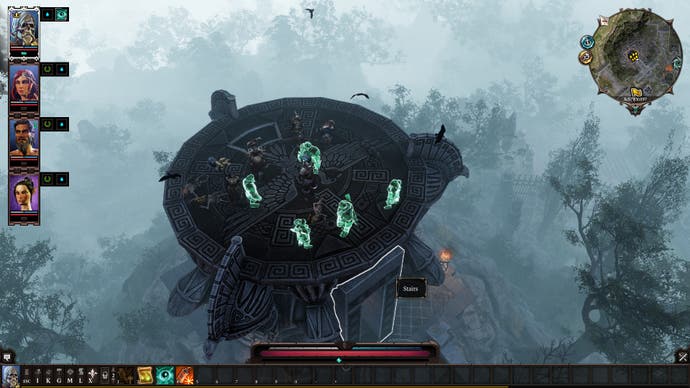
Yet while I enjoyed both the main plot and the backstories to the characters, the best stories in Original Sin 2 are those you stumble upon in the world. I've battled sentient scarecrows, helped a chicken find her lost eggs, and once received a quest by eating a disembodied limb I found in a shark's stomach. I lured a murderer out of a tavern by feeding him tainted stew, and then killed him when he emerged from the outhouse, having relieved himself of his stomach lining. The inventiveness of Larian's writers and designers never ceases to amaze, nor does their ability to anticipate the player's actions.
Then there are the stories you make yourself through the games combat and dynamic systems. At one point I entered an arena fighting competition where all my party were literally blindfolded, and won the match. But afterward the game automatically removed the blindfold, revealing my undead face to the competitors I'd just bested. This resulted in a second, altogether more real fight as everyone recoiled in horror at my eyeless skull, and reached for their blades. Another time, one of my party got imprisoned after being caught trespassing. I broke him out by teleporting him out of his cell and hiding him amid a stack of barrels until the heat was off. I also picked up two quests in the prison that otherwise I might have missed.
Wherever you go and whatever you do in Original Sin, the game constantly impresses with its ability to adapt and accommodate. Some of the quests I embarked upon ended happily, while others were astonishingly bleak. Original Sin is capable of both humour and horror, and this is reflected in the design of its world. The area immediately surrounding Driftwood is an idyllic fantasy-scape; verdant woodland, dramatic cliff-faces, there's even a little lover's grove complete with waterfall and rainbow. Proceed north, however, and you'll eventually reach Bloodmoon island, which is one of the ghastliest places I've explored in an RPG. The ground is slick with blood, body-parts litter the landscape, and what passes for plant-life consists mostly of fleshy bulbs and sinewy vines. In one corner of the island is what I can only describe as a tide of corpses. It's unsettlingly grim stuff.
Regardless of the hospitality of your surroundings, the detail in Larian's environments is wonderful. Arguably my favourite thing about the game is the diorama-like design of its houses and structures, from the cluttered desks and stacks of books that litter an arcanist's office, to the way tables in taverns are sprinkled with food, wine, and utensils. All of this can be touched and picked up and moved around, making Original Sin a rare example of a truly tactile isometric RPG. I love those moments in the game where you have to search one of these busy rooms for a trapdoor or hidden lever, or rummage amongst the desks and bookshelves for a letter or a specific tome.
Were they so inclined, I think Larian could make a marvellous detective game, although they'd need to jettison a few bad habits. One thing that carries over from Original Sin is the puzzle-like nature of its quests, and I remain ambivalent about some of the execution. Original Sin 2 doesn't track quests like other games, providing clear instructions and an exclamation mark on the map to chase. Quest markers are revealed sparingly, while your journal only records brief, cryptic statements about what you've found so far, offering no information on how next to proceed.
The intention is clear enough. With multiple ways to solve most quests, Larian want you to sniff around and discover a solution for yourself. The trouble is sometimes it's not just the solution that's evasive, but the leads that you're supposed to follow. This becomes particularly problematic in the third act, when searching the city of Arx for the missing Lord Arhu (presumably short for Arhu the person I'm looking for?). While pootling around the sewers, I discovered a hidden door that led to a ground of Locke Lamora-esque child thieves' den. I thought this was a neat Easter-egg, but it turned out to be a crucial location related to the Arhu quest. How you're supposed to figure that out logically I still don't know.
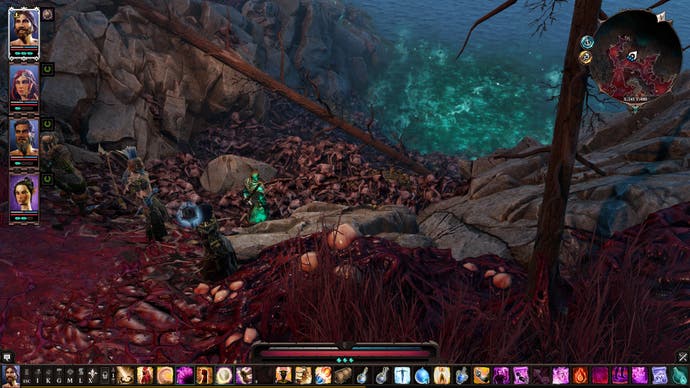
Balancing difficulty is undoubtedly where Larian struggle most. Although Original Sin is an RPG, it has one foot in the strategy genre, evidenced most clearly by the XCOM-style combat. I loved the combat in the first game, and Larian have wisely left the system more or less unchanged, mainly focusing on expanding the classes and abilities. I started out playing as the new Polymorph class, but as the game went on I increasingly leaned toward the Witch's abilities because they're so cool, including the ability to summon a spider made of bones, and call down blood rain from the sky.
The ability to build your own combat style is key element of Original Sin, and the strategic opportunities it offers is basically a game in itself. But mixing classes is a tricky balancing act, and if you get it wrong and spread yourself thinly, you could be in trouble. Combat can be fiercely challenging, especially if you're a couple of levels below your opponents. Put it this way, I played the game on the "Explorer" mode, because I like RPGs to be more about characters and choices than raw challenge, but I still hit a couple of bumps along the road. One battle I fought in a place called the Blackpits took over an hour, as the game sent wave after wave of oily blobs after me, wreathing the whole area in hellish necrofire that will be burned into my mind for the rest of my life.
Still, the merits of Larian's creative choices outweigh the flaws. I like sniffing out my own solutions to problems, and of all the fights I got myself into, only perhaps ten percent of them were unpleasantly difficult. Partly it's about learning to use the tools available to you effectively, to provide your characters with plenty of skills, to use summons and disabling spells to mitigate the numbers of a larger force. To remember to cast Spirit Vision when you're at what seems like a dead end. Perhaps the biggest challenge in Divinity is not necromancer cults or cryptic puzzles, but learning to experiment with all the available systems.
There's such a wide range of influences visible in Larian's work. Ultima and XCOM are the obvious ones, but there are other moments, such as when you're breaking into a house or searching for a hidden hatch to the basement, that the game suddenly feels more like Thief or Dishonored. The game foremost in my mind while playing, however, was The Witcher 3.
This isn't because of the setting or Divinity's similar ponderings over morality. It's because I thought it would be many years before I played another RPG that was even close to being that rich with choice and charisma. Original Sin 2 has made me question that belief, and I don't think I could give it a higher accolade.
